
It may be too early to predict whatanother Bharatiya Janata Party (BJP)-led National Democratic Alliance (NDA)government will mean for Jammu and Kashmir (J&K). Nonetheless, there arevisible clues available to cautiously comment on the new Narendra Modi government’sJ&K policy.
More ofthe Same
The newly appointed Home Minister of India, Amit Shah, will likely continue the “muscular” policy of the previous BJP government. In addition, he may take a step forward in addressing the contentious political issue of abrogating the Articles 370 and 35A, which protect the special status of J&K within the Indian Constitution. Alternatively, he may at least strengthen the narrative around it before J&K’s next Legislative Assembly election due in October-November this year. The BJP’s 2019 Sankalp Patra (manifesto) clearly mentions the party’s historical position on the issue: the “abrogation of Article 370” and the annulment of Article 35A, which “is an obstacle in the development of the state.” Partial modifications to Article 370 may be possible, however, the Modi government may use the judiciary to bring about those changes, instead of taking an executive decision.
Second, steps will be taken to possibly expand the State Legislative Assembly ahead of the state elections. It is not surprising that the delimitation of the J&K assembly constituencies is on Shah’s agenda. The proposed delimitation will redraw the scope and size of the state assembly constituencies and determine the total number of seats to be reserved for the Schedule Castes. According to some media reports, the new government may appoint a new Delimitation Commission in J&K in the coming months to formally start the delimitation exercise. With J&K under President’s Rule since December 2018, the present governor Satya Pal Malik may use his authority to amend Section 47 (3) of the J&K Constitution to delete the proviso that bars the setting up of a Delimitation Commission.
If the proposed changes take place, the BJP may have a chance of gaining increased representation in the State Assembly, which may lead to gains in the party’s stronghold of the Jammu region before the upcoming assembly polls. That may further increase its chances of winning a majority of the J&K Assembly seats, with a possible divided mandate among the Valley-based political parties.
If the proposed changes take place, the BJPmay have a chance of gaining increased representation in the State Assembly,which may lead to gains in the party’s stronghold of the Jammu region beforethe upcoming assembly polls. That may further increase its chances of winning amajority of the J&K Assembly seats, with a possible divided mandate amongthe Valley-based political parties. As a result, BJP could have a chance toelect its own Chief Minister in an alliance set-up with a Kashmir-based party.
Third, the previous BJP government’s “firm policy” or “zero tolerance” on terrorism in J&K will continue in the second term as well. Operation All Out has brought out some favorable results for the security forces during the last couple of years, such as the successful targeting of the top leadership of different terror outfits and the containment of local militancy to Kashmir’s southern districts. Nevertheless, the strategic objective of bringing considerable peace to Kashmir through political means, a logical follow-up of the ongoing military operations, will remain a difficult task for New Delhi.
Furthermore, improving intra-regional relations between Jammu, Kashmir, and Ladakh, limiting terror recruitments as well as curbing terror funding, holding an incident free Amarnath Yatra (pilgrimage), and countering Pakistan’s Kashmir-centric propaganda will also feature as key priorities for Modi’s J&K policy.

WhatLies Ahead
The previous BJP government witnessed multiple security and political developments in J&K during the last five years: civilian unrest after the killing of Hizbul Mujahideen (HM) Commander Burhan Wani in July 2016; border escalations between India and Pakistan after the 2016 Uri attack and the Pulwama suicide bombing in February 2019; the collapse of the Peoples Democratic Party (PDP)-BJP coalition government; and the imposition of the President’s Rule in December 2018.
After five years – and especially since the July 2016 unrest – there are some indications that the situation has improved. There are some reports that the Valley has seen a decrease in both stone-pelting incidents and recruitment compared to the previous two years. New Delhi also managed to conduct crucial Panchayat and urban local body elections in 2018 as well as the 2019 Lok Sabha polls despite grave security threats and a meager voter turnout in the Valley’s southern districts. The next task for the current government will be to conduct the State Assembly elections in J&K, on which a decision will likely be taken pending the successful completion of the upcoming Amarnath Yatra.
The improved security situation has seemingly created a conducive environment to hold the upcoming polls. There are fewer chances of a post-Wani type civilian unrest in the coming months due to a degradation of credible militant leadership and the heightened preparedness of the security forces. For instance, government forces were able to control the potentially massive street protests in the Kashmir Valley after the recent killing of the “most-wanted” militant commander Zakir Musa. Nonetheless, any untoward terror incident, like a Pulwama-style suicide bombing with a high number of casualties, may again put the government on the back foot.
Two recent terror incidents confirm the apparent threat of a Pulwama-style attack in the Valley: first, a failed vehicle-laden suicide bombing attempt by an alleged HM militant on a Central Reserve Police Force (CRPF) convoy passing through the Jammu-Srinagar National Highway in April, and second, the al-Umar Muhajideen-led fidayeen (suicide) attack on a CRPF patrolling party in South Kashmir’s Anantnag. Moreover, the increasing involvement of local Kashmiri youth in high-profile attacks is a cause of concern for the government agencies. Possible consequences of such incidents in the future could include further intensification of the “hard” security measures in the Valley, more local terror recruitments, disruptions or delays in the J&K Legislative Assembly elections, negative ramifications on the local economy because of regular shut downs, an uptick in street violence, and lastly, the worsening of India-Pakistan bilateral relations.
[The] BJP government’s short-term goal will be to win seats in the upcoming elections by prioritizing a tough security approach to militancy in the Valley.
After being given a bigger mandate in the recently concluded Lok Sabha polls, the BJP government may feel more confident in dealing with the Kashmir issue over its next term. After the next J&K Legislative Assembly elections, it may consider taking a softer approach by initiating some confidence-building measures through intra-regional stakeholder dialogues, outreach to the alienated Kashmiri youth, and new development projects in the state. However, the BJP government’s short-term goal will be to win seats in the upcoming elections by prioritizing a tough security approach to militancy in the Valley. This may include tightening the noose around the Valley-based separatist leadership – possibly through the National Investigation Agency investigations in terror funding cases – as well as pressuring Pakistan on the terror issue, among similar measures, as part of its multi-pronged J&K policy to gain seats in the Jammu region.
Lastly, any bilateral engagement with Pakistan on Kashmir is unlikely to materialize as the Modi government’s focus will remain on the terror and connectivity issues. New Delhi does not possibly want to discuss Kashmir with Islamabad while Pakistan seems adamant on keeping it as a priority issue. On the contrary, the Modi government may further intensify diplomatic pressure on Pakistan on the terror issue, especially when the Financial Action Task Force is assessing terrorism financing and money laundering guidelines in Pakistan.
Therefore, Prime Minister Imran Khan’s recent calls for dialogue with India will likely go in vain, as was seen at the recently concluded Shanghai Cooperation Organisation (SCO) summit in Bishkek, Kyrgyzstan, where the two leaders only exchanged “usual pleasantries” and no formal dialogue took place.
***
Image 1: The BJP Website Photo Gallery
Image 2: Tauseef Mustafa via Getty Images


